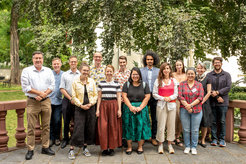Workshop Report “Buddhism in the Anthropocene”
On 13 to 15 July 2022 a workshop entitled “Buddhism in the Anthropocene” was held at the Max Planck Institute for Social Anthropology, organised by Jovan Maud from the MPI and Saskia-Abrahms Kavunenko, a former MPI researcher who is now at the Centre for Contemporary Buddhist Studies at Copenhagen University.

Reactions to the crises
This multi-disciplinary event brought together an international group of anthropologists, geographers, historians, and religious studies scholars to discuss the ways that Buddhists around the globe are responding to the climate crisis, environmental destruction and other phenomena associated with the Anthropocene. Case studies from Sri Lanka, India, Nepal, China, Australia, Taiwan, Vietnam and the UK discussed the various ways in which Buddhist practitioners and communities are conceptualizing and dealing with the unprecedented impact of human beings on global environmental processes.
Mobilization of spiritual resources
One pervasive theme of the workshop was the ways in which Buddhist concepts or frameworks underpin various kinds of environmental intervention. Papers included reports on how environmental activists in the UK are deploying Buddhist ideas and practices in their protests against climate change, how a Buddhist charitable foundation in Taiwan has integrated recycling into the spiritual practice of its members, or how Buddhists in Western Australia actively seek to regenerate the local plant and animal populations. In other cases, we learned how notions of an animated landscape populated with spiritual beings informs the lifeworlds of Buddhist communities and forms the basis of resistance to environmentally destructive development projects in northern India, or how the Sri Lankan government has been deploying forest monks to aid its forest regeneration programs as part of its international climate commitments.
Ambivalence of Buddhist interventions
Workshop participants were also careful not to assume that Buddhist practices are always “good” from an environmental perspective. Thus, the paradoxes and ambivalences of spiritual practice and care for the environment was a common workshop theme. Some papers dealt with the sometimes problematic relationship Buddhist practice has with materiality and waste, for example how Buddhists are dealing with new materials such as plastic and concrete in their ritual lives, including the ways that increasing use of plastic ritual objects is creating new dilemmas for Buddhists in Himalayan India. Another paper reported on the increasing popularity of “environmental” rituals in China, such as releasing fish to demonstrate compassion for other beings, but which often have extremely negative environmental consequences.
No withdrawal from the world
Overall, the workshop papers helped to demonstrate how diverse Buddhist responses to the Anthropocene are, but they make clear that Buddhist groups and individuals are not withdrawn from the world, occupying themselves with spiritual pursuits, but are variously engaged, for better or worse, with the material consequences of human activity in the world. Selected papers from the workshop are now being reworked for inclusion in a special issue of the Journal of Global Buddhism.
